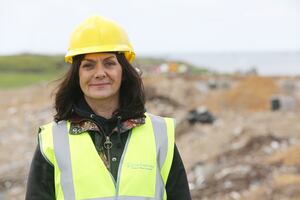Bin men 'have coped well' with increase in household collections
WHILE household material collected through kerbside recycling is up by nearly a third, the amount of general rubbish from businesses has more than halved.

Since the Covid-19 lockdown began, there has been a shift in the type of waste being thrown away and recycled.
Household general rubbish has increased by 20% compared to pre-lockdown levels as islanders spend more time at home and away from work.
Household glass collections have seen the biggest increase, nearly doubling from an average of 24 tonnes per week pre-lockdown to 47 tonnes now.
Most of that rise is thought to be as a result of the closure of bring bank sites, which previously collected about 13 tonnes of glass a week.
The closure of pubs and restaurants has also had an impact, with many islanders switching to more at-home drinking.
The amount of glass coming from businesses has fallen from 11 tonnes a week to two.
Blue and clear bag tonnages have also seen a 10% increase since the lockdown, suggesting that most bring bank users have successfully switched to their collection service.
Prior to the lockdown, around 90% of plastic, tins and food and drink cartons came from kerbside pick-ups, with around nine out of 10 households using the service regularly.
Household food waste is also up by nearly a third, with an increase of nearly 20 tonnes per week. By comparison, commercial food waste has fallen by more than 15 tonnes a week.
Recycling officer Tina Norman-Ross said that it was no surprise that more material was being collected from households and the bin men had been doing a fantastic job dealing with the increase.
‘Most islanders normally spend upwards of eight hours a day at work or out and about, but since the lockdown we are all spending a lot more time at home,’ she said.
‘So we fully expected to see a big switch away from commercial to household and the parish collection contractors have done a fantastic job dealing with that.
‘When you include what we received from businesses, the total amount of waste and recycling is up around 4%. However, the amount of this that is being recycled is up by 7%.’
She said this might be a sign of there being better separation at home, which was encouraging.
‘With pressure on budgets and islanders getting used to shopping less often, we would like to think food waste will reduce. It is difficult to see from these figures if that is happening, because of the changing patterns.
‘However, cutting down on food waste is an easy way to save money. While households have more time at home we would encourage them to think about what they throw away.’
Previous estimates were that, on average, households could save as much as £800 a year.
Top tips for islanders are to plan meals ahead, check what you have in the fridge and cupboards before going shopping, then make a list and stick to it. ‘Only buying what you need, coupled with proper portion planning, are the best ways to cut down waste,’ Mrs Norman-Ross said.
All public waste and recycling sites closed at the end of March, when islanders were advised to avoid all non-essential journeys. Garden waste sites and the household waste and recycling centre at Longue Hougue have since reopened, with social distancing measures in place. Guernsey Waste is now considering how to reopen some bring bank sites for islanders who are unable to use kerbside recycling.





